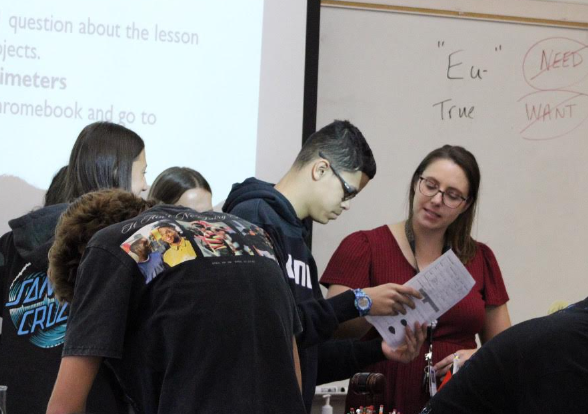Generation Z is often labeled as the generation that has grown up with the most issues plaguing their mental health. With such as generation having been born from 1997 to 2012, having such an outlook on a generation is not a new concept. Since the Cold War, cultural movements such as the grunge movement for Generation X as a rejection to the chaotic world at the time was epitomized in the glorification of bands such as Nirvana, Soundgarden, and Alice in Chains. These bands stemming from further rejection created by early punk culture of the 1970s, through the likes of The Ramones, The Sex Pistols, and The Clash. A culture of expression and rejection that came from a similar place. However, such a culture has only become more concentrated and widespread with time.
The Doomsday Clock is a tool created by The Bulletin of Atomic Scientists in 1947 in response to growing existential fear in the face of nuclear warfare. Later in 2007, other global catastrophes such as climate change and threats of Artificial Intelligence were included, detailing how many metaphorical, “minutes to midnight” humanity has till total global catastrophe, with the furthest being 17 minutes in 1991. Today, the clock remains at 90 seconds to midnight.
The latest reporting of the doomsday clock was reported by CNN10, a popular internet news broadcast that is viewed by children in schools all over America. The report was published on Jan. 24, explaining that scientists think we are at the closest humanity has ever been to the end of the world.
“I think it’s because they grow up knowing that there are way more problems and not as many good things in the world that they’re gonna have to deal with,” Max Ocoterena said. “I mean, there have been and always will be problems, but our generation is able to know about them much faster and much more frequently.”
Gen Z has been told that they have been going through some sort of catastrophic event; whether it be global health crises like the COVID-19 pandemic, conflicts overseas or threats to the future like artificial intelligence and economic hardships. For a child today, one is shown more bad than good.
“I see a lot of adults talking about how much easier life used to be and then how much they struggle to have the same level of life,” Ochoterena said. “It just doesn’t make the future very appealing or [as] appealing to be an adult.”
An important part of how the internet works and it being a concentrated display of human contact can sometimes yield positivity, but often proposes negativity. There are no rules to the internet; anything can be accessed or posted without accountability. During adolescence, a child is at their most impressionable as the way they see the world later in life is dictated by what they are brought up seeing.
“I feel like kids today are exposed to the world and its problems at a very young age.,” Yuvan Gautam said. “I mean, I was introduced to gore and um, ‘adult content’ in the third grade. I didn’t even know what it was or how to react, you’re not being taught, you’re just being shown, it’s just a big flash in your face that you just kinda have to live with.”
With how convenient it is to be exposed to pornography, gore or content aimed toward adults, concepts of death, destruction and the ultimate ugliness of humanity becomes normal, and often becomes a topic of desensitization.

“I mean if I scroll through a few reels on Instagram, I probably will see more than one video of someone dying or getting brutally injured in some way. To be completely honest, a lot of them are kinda comedic in a way [because] that’s just the tone they are posted in, like death as a concept at least online is kinda just not what it used to be I guess,” Ochoterena said.
The culture of society has shifted into one where life exists in digital form – the ugliness and the beauty and the insides and outs of what people do and say. These factors have gone on to influence entertainment to where Hollywood has silently shifted to a pattern of displaying themes of existentialism.
“Even in like movies and stuff. The best picture winning movie of 2022 was ‘Everything Everywhere All At Once.’” Gautam said. “The whole point of the movie is talking about nihilism, but in a good way, like just doing whatever you want while you have the time [because] like who cares what you do? It’s the same with one of the things from the Barbie movie. Like the whole concept of the main quote, What was I made for?’ It’s a very existential sentiment to think about. ‘What was I put on this Earth for’ [or] ‘what am I going to do with the time that I have?’ It just keeps going in ‘Oppenheimer,’ the whole movie is about one of the greatest inventions in the history of the world that could also cause the end of the world.”
Generation Z is also labeled as the most influential generation in history In an age of constant meshing of new ideas and information, good and bad, there exists a new wave of a culture that is ambivalent to the ways other people live their life, providing a new perspective that was not as prevalent in earlier generations.
“I’ve seen old videos from my father, and obviously he’s from another country, but people care a lot about what people think about them, how they act, what they do [and how they dress],” Eduardo Martins said. “There’s a certain standard, especially in Japan, that you have to dress a certain way, you can’t dye your hair [and] if you have a hair color aside from black, you have to tell them. Even in [countries] like Korea or Brazil, too. There’s just a lot of people caring too much about what other people think of them and once you start to stop caring, your life becomes a lot better.”
Over time, the rebellious culture that was built on uncertainty of the world has shifted. While grunge and punk culture still exist, different sub cultures in general have assimilated into each other. Partially due to the widespread use of the internet, and partially due to a new culture of inclusion. It is far more recognized that different cultures, ideologies, and philosophies exist than ever before. These ways of life have gone onto mesh with one another in such a way that there exists far less concern, but far more encouragement for people who are different.
“I definitely feel like that’s the thing, putting out messages or just stressing the importance of how life is short and you should cherish every moment, just because the world is a scary place doesn’t mean you that’s all there is to it. In the grand scheme of things, we only really need to worry about ourselves, if people find happiness in the way they live their life then who am I to have a problem with that?” Gautam said.
BY MATVEY YAZKOV AND ELIAS WHITEHEAD















